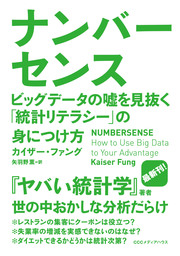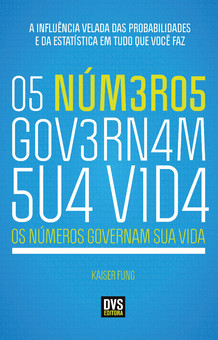My Books
My books bridge the gap between the analytics profession and the mass audience. They explain how statistics and probability affect our lives, and how each of us should respond to the era of Big Data.
NUMBERSENSE: How to use Big Data to Your Advantage
(McGraw-Hill, 2013)
Numbersense is the noise in your head when you see bad data or bad analysis. In the Big Data age, when everyone is peddling stories supported by data, we all must hone our numbersense to figure out who we can trust and what is junk. Fung demonstrates how to use numbersense in a series of case studies from business, healthcare, economics, education, and sports.
Link to Amazon
Reviews of Numbersense
“I laughed my way through this superb-useful-fun book & learned and relearned a lot. Highly recommended!”
“Numbersense correctly puts the emphasis not on the size of big data, but on the analysis of it. Lots of fun stories, plenty of lessons learned—in short, a great way to acquire your own sense of numbers!”
“Kaiser’s accessible business book will blow your mind like no other. You’ll be smarter, and you won’t even realize it. Buy. It. Now.”
“Each story in Numbersense goes deep into what you have to think about before you trust the numbers. Kaiser Fung ably demonstrates that it takes skill and resourcefulness to make the numbers confess their meaning.”
“Kaiser Fung breaks the bad news—a ton more data is no panacea—but then has got your back, revealing the pitfalls of analysis with stimulating stories from the front lines of business, politics, health care, government, and education. The remedy isn’t an advanced degree, nor is it common sense. You need Numbersense.”
NUMBERS RULE YOUR WORLD: The Hidden Influence of Probability and Statistics on Everything You Do
(McGraw-Hill, 2010)
Using a set of case studies, I illustrate five fundamental concepts in statistical thinking. This is how I envision a first exposure to statistics should be like. It is a pity that the typical Statistics 101 class is constructed around a succession of mathematical techniques.
In Chapter 4, I predicted the false negative crisis in steroids testing before the Lance Armstrong fall from grace, at a time when the media was obsessing about false positives. In the same chapter, I discuss the statistics of predicting terrorism.
Link to Amazon
Reviews of Numbers Rule Your World
“An easy read with a big benefit”
“For those who have anxiety about how organization data-mining is impacting their world, Kaiser Fung pulls back the curtain to reveal the good and the bad of predictive analytics.”
“A book that engages us with stories that a journalist would write, the compelling stories behind the stories as illuminated by the numbers, and the dynamics that the numbers reveal.”
“Little did I suspect, when I picked up Kaiser Fung’s book, that I would become so entranced by it - an illuminating and accessible exploration of the power of statistical analysis for those of us who have no prior training in a field that he explores so ably.”
“A tremendous book. . . . If you want to understand how to use statistics, how to think with numbers and yet to do this without getting lost in equations, if you’ve been looking for the book to unlock the door to logical thinking about problems, well, you will be pleased to know that you are holding that book in your hands.”
“I thoroughly enjoyed this accessible book and enthusiastically recommend it to anyone looking to understand and appreciate the role of statistics and data analysis in solving problems and in creating a better world.”








